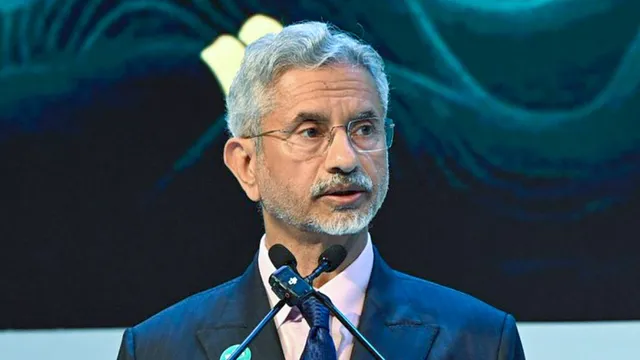- By Priyanka Koul
- Fri, 21 Feb 2025 11:45 AM (IST)
- Source:JND
Speaking at the inaugural G20 Foreign Ministers’ Meeting in Johannesburg, External Affairs Minister S Jaishankar emphasised that coercion should have no place in international relations and advocated for greater plurilateralism, arguing that global priorities should not be dictated by a select few.
EAM Jaishankar highlighted the deep fractures in multilateralism, noting that institutions like the UN and its Security Council often remain deadlocked.
During the meeting, which precedes the G20 Summit set for 22-23 November in Johannesburg, Jaishankar reaffirmed the importance of upholding international law, particularly the 1982 United Nations Convention on the Law of the Sea (UNCLOS). He stressed that agreements must be honoured, and coercion must be avoided.
He also pointed out that simply reviving the UN Security Council’s functions is insufficient—its structure and decision-making processes need reform. More plurilateral collaboration is necessary to bridge global gaps, and international cooperation should become more transparent and less unilateral. He insisted that the global agenda should not be shaped by a handful of nations.
Jaishankar’s comments came shortly after China took part in Pakistan’s multinational AMAN-2025 naval exercise alongside Indonesia, Italy, Japan, Malaysia, the US, and observers from 32 other countries. Beijing framed its involvement as a step toward enhancing maritime security, protecting trade routes, and combating piracy. However, its growing presence in the Indian Ocean aligns with its broader naval expansion strategy, raising concerns in India.
The exercise coincided with India’s TROPEX drill, a large-scale naval exercise focused on combat readiness. India remains wary of China’s “String of Pearls” approach, which involves establishing military outposts and alliances across the region. Further intensifying tensions, China recently deployed two research vessels to the Indian Ocean, prompting additional apprehensions in New Delhi.
Jaishankar also underscored India’s commitment to maritime security, particularly in the Arabian Sea and the Gulf of Aden, where the Indian Navy has played a key role in ensuring stability. He stressed the importance of restoring normal maritime trade, which has been disrupted due to geopolitical tensions.
"Safeguarding maritime security in this region is crucial. The Indian Navy has actively contributed to stability in the Arabian Sea and the Gulf of Aden. Restoring regular maritime commerce remains a top priority," he stated.
Beyond maritime security, Jaishankar addressed broader global concerns, including the Gaza conflict, the exchange of hostages, and the ongoing war in Ukraine.
"We welcome the Gaza ceasefire and hostage release, support humanitarian aid, denounce terrorism, and back a two-state solution. Maintaining the ceasefire in Lebanon and ensuring a Syrian-led, Syrian-owned resolution are crucial. Regional peace and stability benefit the entire world," he said.
Also Read: Elon Musk's Tesla Prepares To Send First Shipment Of Cars Soon: Report
On Ukraine, Jaishankar reiterated India’s consistent stance, advocating dialogue and diplomacy as the path to ending the war. "The world expects all parties involved to engage meaningfully to resolve the conflict," he added.
Meanwhile, US President Donald Trump is reportedly working on a peace deal with Russia, which could have significant implications for the Ukraine war. However, European leaders and Ukrainian President Volodymyr Zelensky have allegedly been left out of these discussions, raising concerns about the proposed agreement.
Jaishankar acknowledged the realities of geopolitics and national interests but stressed that diplomacy, particularly within a platform like the G20, should focus on finding common ground and fostering collaboration.
Also Read: Instagram DMs Just Got A New Update: New Features You Need To Know About!
"Differences should not escalate into disputes, disputes must not turn into conflicts, and conflicts should not lead to greater crises. There are important lessons to be learned from recent years, and we must use this experience to guide the world toward a better future," he concluded.

